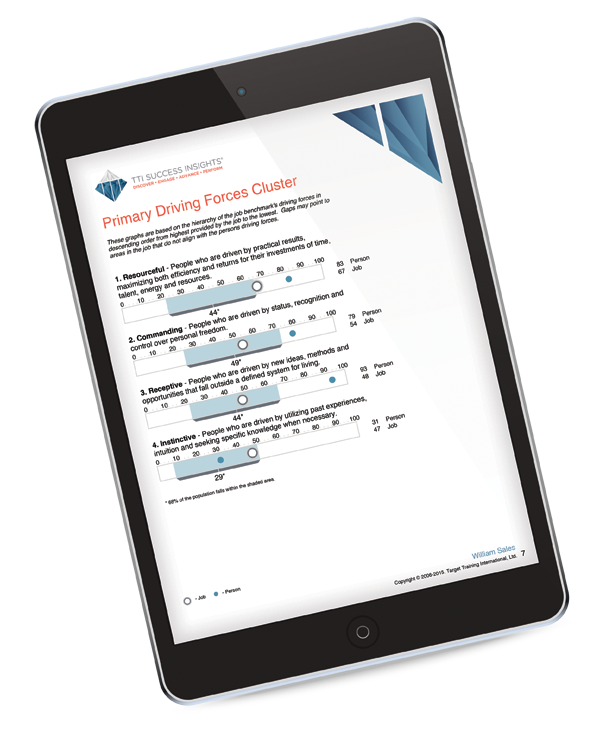5 mistakes people make with the DISC profile
Singular Use of Assessments Offers Narrow-Focused Approach to Hiring

DISC has enjoyed immense popularity and acceptance in HR and among consultants since the late 1980s. (For those of you who have never done a DISC assessment, click here to sample one.)
With its broad, long-established and passionate fan base, we sometimes find consultants, coaches and trainers can have a tendency to see people dynamics through the lens of this single tool.
Sometimes, this means DISC is used to explain things about people beyond the scope of what it is actually designed to measure, while ignoring other important elements of human personality.
What follows are five of the top mistakes we commonly see consultants make when training or coaching with DISC.
MISTAKE #1
“DISC is a complete personality profile”
While DISC is commonly understood as a type of personality test (because it’s often incorrectly marketed this way), it’s actually a type of behavioural assessment. Understanding this difference is vital, and, in our experience, is almost always ignored or overlooked by inexperienced consultants.
DISC explores four traits within our personality, but the term “personality” is an all-encompassing word that goes far beyond the scope of four DISC behavioural traits. Personality is much more than our behaviour and includes things like our values, beliefs, sense of humour, character, ethics, temperament, emotional maturity, thinking preferences and manner of communicating. DISC is not a complete measure of who we are, but simply one aspect of what makes us unique: how we prefer to act and communicate (or behavioural style).
DISC is an extremely valuable tool, but it’s not the ONLY tool you need to understand human dynamics. Personality is deeply complex and includes other important elements such as values (see the Motivators assessment) and emotional intelligence (see Emotional Quotient), which should not be ignored when introducing DISC to people for the first time.

MISTAKE #2
“All DISC suppliers are offering the same product.”
The DISC theory itself (created by William Marston) was never patented, so over the years there have been dozens of different versions developed and sold around the world — each using different questionnaires, levels of accuracy and training methods.
Most of the major sellers of DISC around the world only offer DISC. We believe this approach is limiting. TTI wrote the industry-standard textbook on DISC, were the first to computerise the DISC assessment, and have the most highly valid questionnaire on the market.
Over and above these things, the most significant point of difference with the TTI suite is that unlike ALL other DISC providers, the TTI suite offers five sciences of human performance: Behavior, Motivation, Competencies, Acumen and EQ. This provides consultants, trainers and coaches with better capabilities and a broader scope of solutions.

MISTAKE #3
“DISC tells you who will be a superstar or dud performer.”
Probably the most common error made in using the DISC model occurs when someone assumes that a DISC profile will explain who will succeed or fail in a job. DISC only measures common behavioural tendencies — not skills.
DISC does not predict job success — there is no such thing as a “best” profile for any position. Any type of DISC profile can succeed in any type of profession. It’s important to remember DISC is only one part of the picture and there are many other elements that affect job performance.
The only way to accurately determine whether a person is “well suited” (behaviourally speaking, at least) to a job is by objectively and scientifically benchmarking it.

MISTAKE # 4
“You say your boss is pushy, rude and a total jerkface? Well, that’s because of his/her high D.”
It’s possible to have any combination of DISC profile and be thought of as a [insert descriptive adjective]. It’s true high D’s are more likely to rub certain people the wrong way since they have a tendency to be outspoken, candid and won’t shrink from confrontation.
And so the question we get from many leadership consultants and HR professionals becomes something like this: “Is his/her high D the reason the person is a jerk?” The answer is “no.” If someone is generally thought to be a [descriptive adjective], that would depend on something else, most likely to do with EQ or underlying core motivators.

MISTAKE # 5
“High D/I’s are the best salespeople/leaders.”
It’s natural for high I’s to believe they are the best salespeople/leaders. The logic is straightforward enough: high I’s like interacting with people; sales/leading is all about interacting with people; therefore, high I’s are built for selling/leading.
Many high I’s are good at dealing with people — they can be friendly, sociable, warm and enthusiastic — but others aren’t. Some high I’s can be selfish, shallow, disruptive, unruly, impulsive and noisy. Again, this difference comes down to EQ — the basis of social effectiveness.
It’s clear, though, that in most benchmarks, we could expect to see the Utilitarian value as the highest. It’s reasonable to conclude if salespeople do not have a Utilitarian value in highest (or second highest) position, they will struggle to succeed. Motivators are actually far more important to know in this situation than DISC.
Closing Remarks
The key theme in this discussion is the need to move beyond just focusing narrowly on someone’s behavioural profile and toward building a more complete picture with the use of multiple assessments. This is achieved by bringing other sciences into the picture that are designed to complement the DISC assessment, while also offering more powerful insights through integrated feedback.
About the Author
Theo Winter works as a Client Services Manager, Writer & Researcher for TTI Success Insights Australia, a leading provider of assessment-based talent management solutions. He is among the youngest in the world to receive accreditation in TTI’s suite of assessments, and for the past seven years has worked with hundreds of HR, L&OD professionals and business consultants to bolster the emotional intelligence, engagement and performance of managers and their teams.
10 Things Successful People Do Every Day
What if there was a secret formula for success that you could copy? Kevin Kruse best selling author recently interviewed more than 200 highly successful people to find out what their number 1 secret to productivity? These people included 7 billionaires and 13 olympians. The answers have been distilled into 10 Simple Steps you can follow to achieve your own success.
3 Easy Steps to Building a Solid Company Culture
Companies need to reimagine how they attract – and retain – employees by giving them what they desire, resulting in keeping them happier and more engaged. I am unique. So is every other employee. Companies would be wise to get to know their employees on a personal level and find out what is truly important to each and every one of them. Then, create a unique plan for each person that helps the employee achieve what he or she strives to achieve.
How Employee Experience Leads to a Highly Productive Workforce
We believe in order to create engagement, employers need to move beyond believing that experience is all about extra benefits at work such as Massages Mondays and Pool Tables. Real employee experience begins with meaningful work. What can your organisation do to create meaningful work for your people? What can you do to make your people feel connected and to feel like they belong and they trust you? Isn’t this what Experience is all about?

FREE DISC Assessment: Find out what your behaviours really are!
Have you ever taken a DISC Assessment? Actually… Have you ever taken a TTI DISC Assessment? Well why wait any longer, lets find out why you really behave the way you do!




